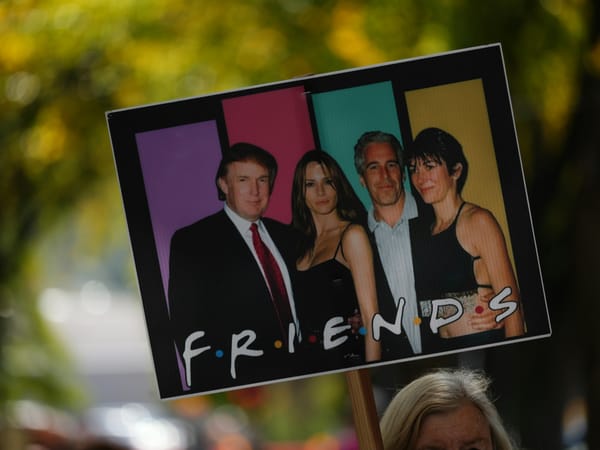SHE”IN” or “OUT”? Paris Says “No” to SHEIN’s First Permanent Store
On the first day of SHEIN’s grand opening in Paris, shoppers and protestors rally at the BHV department store. The fast-fashion giant now faces controversies, boycotts and fury over labor issues, sustainability, and scandals involving its sales of “childlike” sex dolls
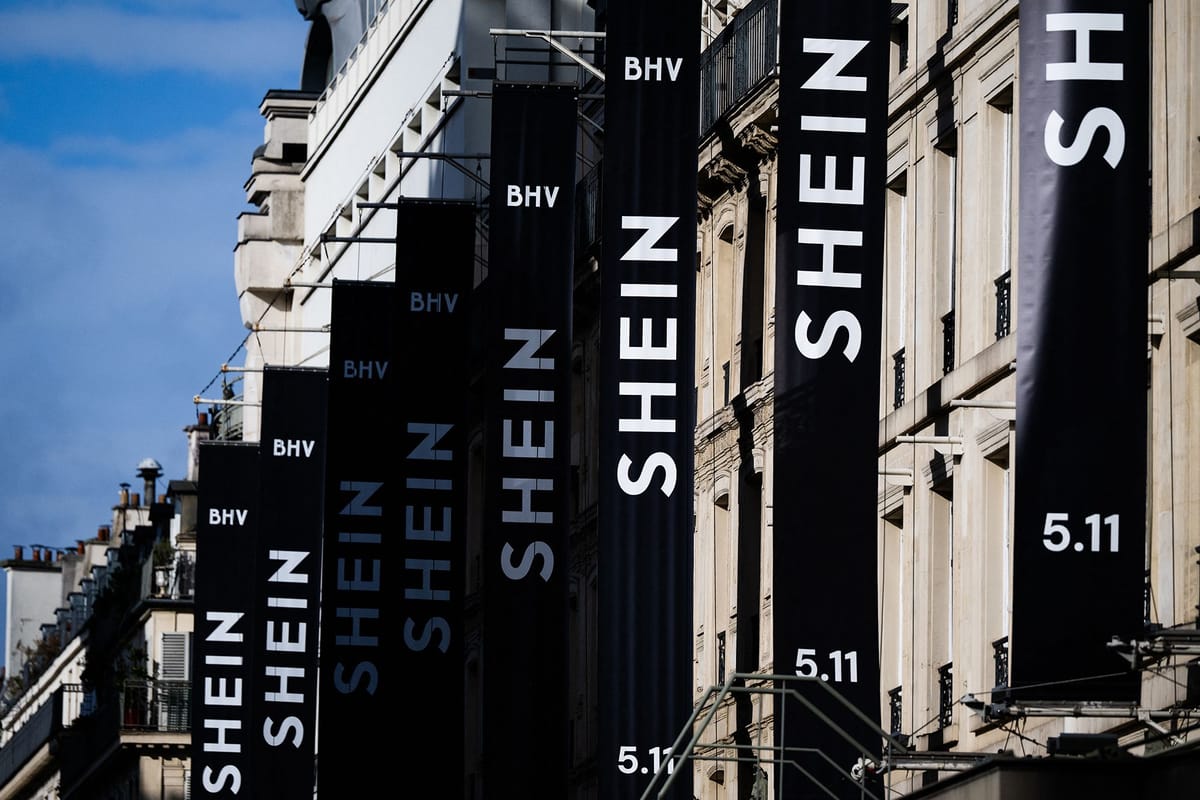
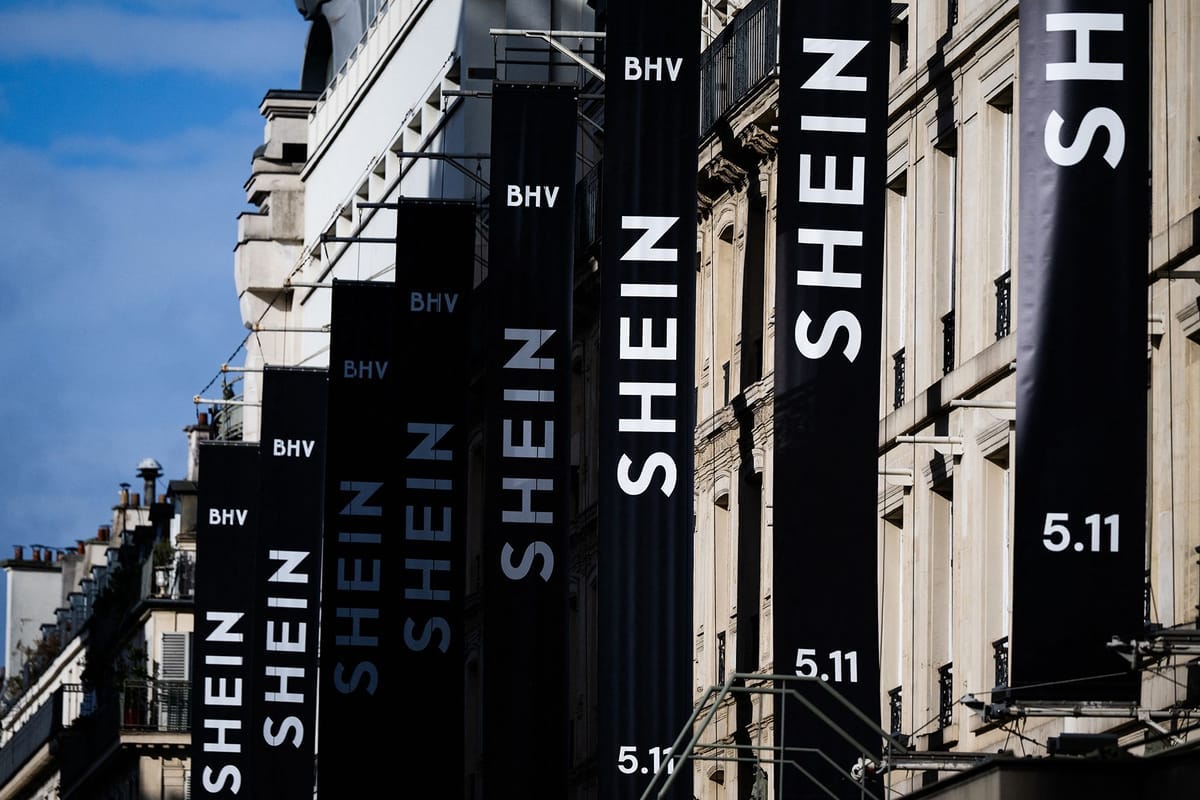
On 11.5, in the Marais District, fast-fashion retailer SHEIN was poised to shine at its big moment — the grand opening of its first permanent store on the sixth floor of BHV (Le BHV Marais), the historic department store in Paris.
At the gate of BHV, hundreds of shoppers gathered, waiting to stream through the heavy glass door and get their hands on clothing that cost twenty-five euros elsewhere but only four euros here.
As shoppers lined up, a different crowd also assembled. Across the street, protestors held their boards and posters high above their heads.
“Shame on you!” Shouted angry protestors to the shoppers, who turned their heads away from those middle fingers.
Without applause and bouquets, SHEIN opened its store amid unexpected yet unstoppable protests and boycotts. Police officers soon arrived and stood guard, but none of the protestors retreated.
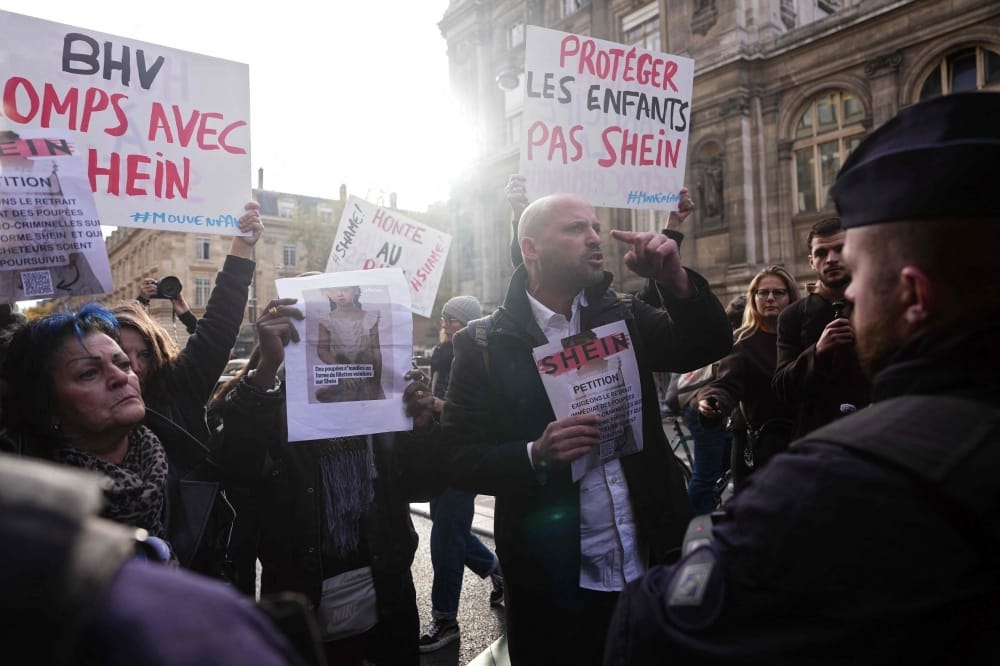
We often say “one man’s meat is another man’s poison,” and this is exactly the definition of SHEIN nowadays.
Well, who is SHEIN?
Originally founded in China and later moved its headquarter to Singapore, SHEIN is a fast-fashion retailer famous for selling trendy clothing and accessories at ultra-low prices on an e-commerce site. People have heard about or perhaps purchased items from SHEIN for quite some time, but seldom do they know the engine behind its rise: its platform relies on a digital supply chain to track sales, coordinating with factories in real time and quickly responding to demand. As a result, in a very short period of time, SHEIN has become one of the world’s largest and most profitable fast-fashion retailers, operating in more than 150 countries.
Earlier this year, SHEIN had planned to open its first permanent store at BHV and launch five additional locations in Dijon, Reims, Grenoble, Angers, and Limoges, in partnership with commercial real estate company Société des Grands Magasins (SGM).
Given the superb location of the BHV department store on the north bank of the Seine, SGM desired to revitalize the store’s business by attracting more Gen-Z customers through SHEIN. At the same time, SHEIN viewed this partnership as a chance to boost its impact and create new jobs — the new store was expected to bring around 200 positions.
The collaboration was scripted to tell a story of win-win situation, yet before act one could even unfold, it cut abruptly due to overwhelming public pressure. Paris is shouting “no” at SHEIN’s arrival. Mutual gains no longer exist, and both parties now face heavy losses.
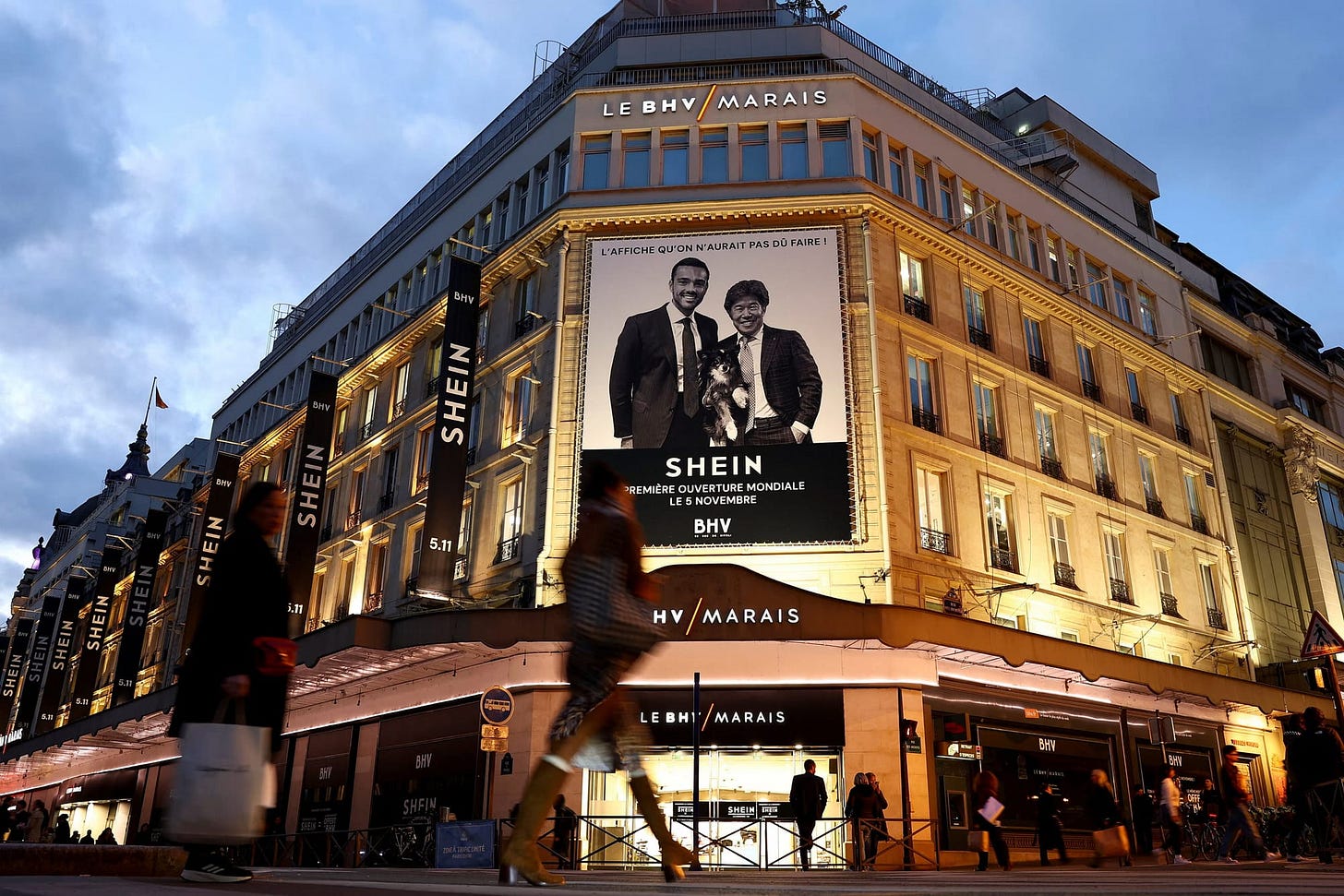
The fury of protestors did not arise out of thin air. In fact, in early October, BHV CEO Frederic Merlin had posted a photo with SHEIN’s executive chair Donald Tang on Instagram, announcing that BHV would host SHEIN’s first permanent store on its sixth floor. In response, numerous brands expressed their concerns and firm refusal to accept this decision. Over fourteen brands, including AIME, Culture Vintage, and Talm, threatened to close their BHV stores.
“This decision does not correspond to our values or what we stand for...By integrating SHEIN, BHV is sending a very negative signal to the entire sector,” said Mathilde Lacombe, the co-founder and president of skincare brand AIME, on LinkedIn. “We want to remove AIME from BHV,” she added.
For brands, SHEIN’s biggest issue lies in its excessive carbon emissions and exploitative labor practices, while simultaneously achieving rapid production through plagiarizing the work of major brands and independent designers during its development.
However, this long list of controversies was clearly not the main catalyst for the fierce protests against SHEIN store’s opening.
What exactly happened? It all began on 11.4, a day before SHEIN store opened, when French media outlets unveiled a shocking scandal of SHEIN France.
After receiving multiple anonymous complaints, French authorities investigated SHEIN France’s e-commerce platform on Monday and discovered a considerable amount of third-party sellers selling sex dolls with childlike features. These dolls in white dresses are approximately 80 centimeters tall, show innocent expressions, and hold teddy bears in their arms.
On SHEIN, one can easily order pedophilic products like buying a regular everyday T-shirt. This finding terrified and irritated the nation.
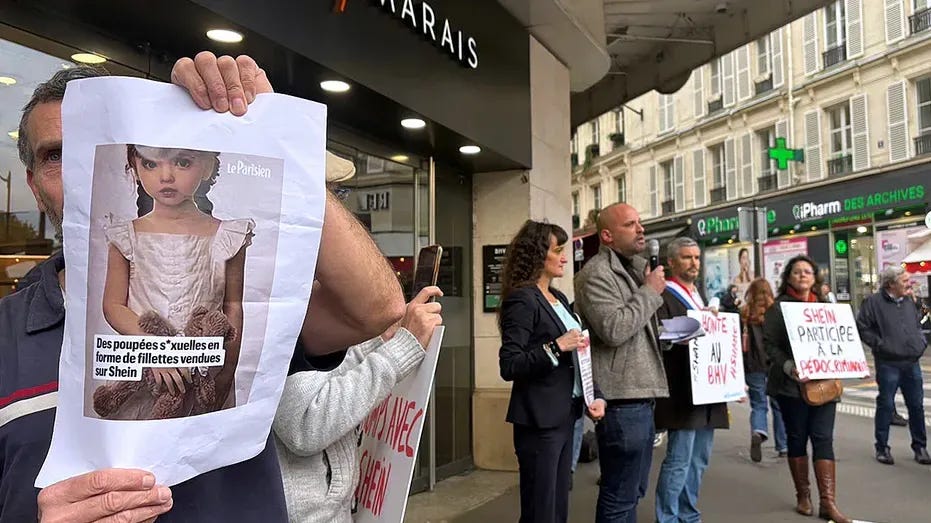
Confronting public criticism, SHEIN reacted fast, stating that it will track and suspend sales of all inappropriate dolls globally. It further pledged to discuss consumer protection issues with French authorities as soon as possible.
“We are tracing the source of all illegal products and will take action against those responsible. We will also examine our internal processes thoroughly and reinforce our safeguards to protect customers,” emphasized Tang during media interviews.
Like what Tang said, SHEIN France removed all illegal sex dolls and deleted relevant images from its platform within 24 hours. Nevertheless, the public remains highly unconvinced — or, in other words, people feel ungrounded to spare their trust. SHEIN’s behaviors of openly selling products with pedophilic connotations and imposing no age restrictions have severely passed the red line. People’s insecurity and outrage continue to grow, eventually sparking intense protests that disrupted the opening of SHEIN’s BHV store on Wednesday.
“Should these violations repeat, we will demand that the SHEIN platform be banned from the French market. These items are horrible,” warns Roland Lescure, the finance minister of France, on CNN affiliate BFMTV. The French government and local authorities, including the DGCCRF, France’s anti-fraud office, are taking action to investigate and suspend SHEIN.
Quentin Ruffat, SHEIN France’s spokesman and director of external relations responded to BFMTV and acknowledged the accusation.
“We take the concerns very seriously,” he told BFMTV. “These child sexual contents are undoubtedly unacceptable and we will cooperate with judicial investigation to prevent the situation from happening again.”
While the retailer’s plan of expansion in France has long faced significant disapproval from consumers, brands, and politicians, this scandal only added more fuel to the inferno, causing SHEIN rapid-fire troubles.

Meanwhile, to ensure that no additional illegal and dangerous products are entering France, custom officials unpacked and inspected around 200,000 SHEIN parcels that arrived at Paris’ Charles de Gaulle airport. As expected, non-compliant goods were found in several packages.
On top of that, France has demanded the European Union to launch a careful investigation into all the dark corners of the marketplace. E-commerce sites like Temu and AliExpress were as well under investigation for selling similar inappropriate products. At this moment, what may be more crucial than the sex toys themselves is tracking down their sellers and buyers.
Despite all efforts, the suspension of SHEIN’s site ended on 11.7 since SHEIN had removed all illegal items within the 48-hour period of rectification. The French government has granted the brand the right to preserve its site, but it will remain under governmental scrutiny for a while.
This might a disappointing news, as the concerns of many have not been fully resolved and the penalty weighs like a feather. The fact that more shoppers lined up at the store than protestors draws the question: Does SHEIN deserve a second chance?
The debate is ongoing. But at least for now, the fate of SHEIN France remains uncertain as the rest of its unopened delivery packages — the company can never predict whether they hold opportunity or greater trouble inside.
Also read from The Art Newsletter.




